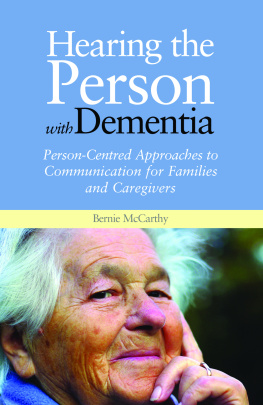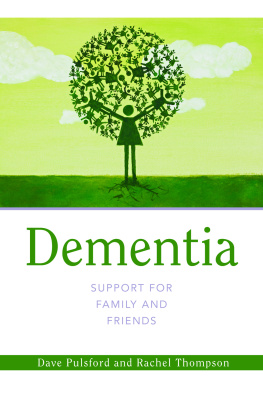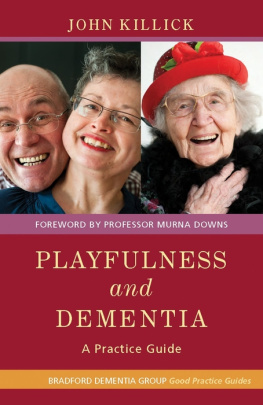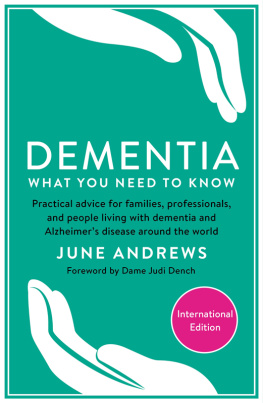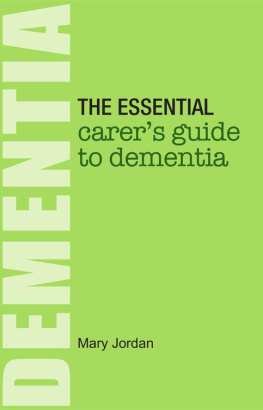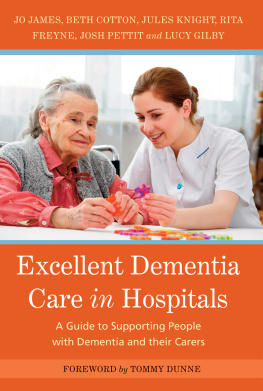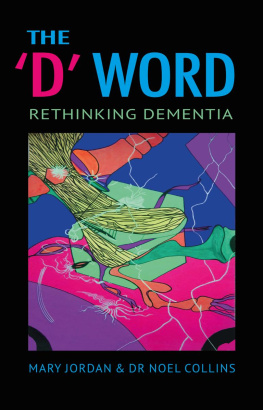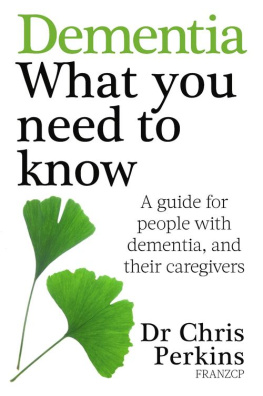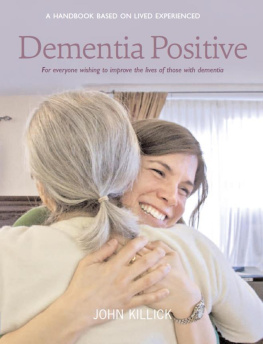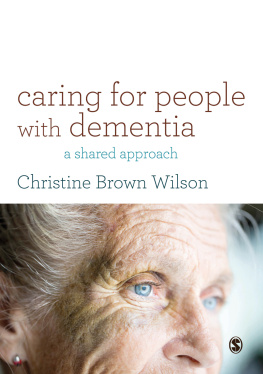Without the enormous privilege of being allowed to enter peoples lives, often at times when they are at their most vulnerable, we, the editors of this book would not have had an opportunity to develop our thoughts.
It is in the hope that this shared experience, from patients, their families and their professional and lay carers, will be of benefit to others, that we have written this book.
That is certainly the essence of the generosity of our patients that others might benefit from their experience. We might add that there were also exchanges of joy and it is essential that these too are shared.
Acknowledgments are also due to the authors of individual chapters, who generously agreed to contribute their clinical experience and expertise to this volume through spending many hours writing and responding to our queries. This has enabled us to produce a volume that is far reaching in scope and one that we hopefully anticipate will set standards of good practice in the care of elderly people for many years to come.
Editorial staff at Routledge have supported us throughout the process, through their own expertise and encouragement. In particular we thank Joanne Forshaw for her support of the project from the outset.
Finally we thank our friends and colleagues who are past and current members of the Older Adults Section of the APP (Association of Psychoanalytic Psychotherapy in the NHS) who have over many years been a source of stimulating discussion and inspiration, sparking ideas together in moments for articles, books and conferences and who have contributed ideas, and in some cases chapters to this latest project, especially as it has taken shape in recent months.

Chapter 1
Encountering dementia
Louis Resnick
It was a fruitful afternoon on urology. I had come to work: taking histories; examining patients.
An elderly gentleman, smartly dressed in crisp white shirt, green tie and tweed blazer was pacing up and down the corridor. He periodically stopped, looking lost before journeying on. Was he alright? Did he need help?
He was kempt, thin wisps of white hair combed into a side parting. He smiled and nodded when I offered to accompany him. Polite conversation ensued. He spoke with charm and intelligence of his service in the Second World War and the successes of his three children.
However, something was wrong. He told me the floors we walked on used to belong to an army barracks where he was stationed after the War. He made vague references to a hotel, the other patients as guests and me, a member of staff. He mentioned his wife who would pick him up soon.
After a few laps of the corridor I wanted to get back to work. He was pleasant but keeping me from learning opportunities. I steered him towards his bed, into his armchair and drew conversation to a close.
Flicking through the gentlemans notes Alzheimers Disease I felt a twinge of sadness to read that his wife had died two years previously. Overall I felt I had done well; demonstrating appropriate and sensitive engagement with a person with dementia. I returned to work.
Before long the gentleman appeared at the office doorway. He tried to gain my attention: Im sorry, Sir, I have work to be getting on with, I will see you in a while. This failed to placate. Lingering turned into pestering and polite refusal turned into ignoring. Entering the office he tapped me on the shoulder. Feeling a boundary had been crossed, I got up, ushering him from the room. He stopped me in the corridor and grabbed my forearm.
He was angry, explaining that for the past two hours I had been keeping him waiting for the hotel manager. I responded with But Sir I was with you only five minutes ago Alas our realities were not reconcilable. Hostility ensued. He insisted I account for my actions, I persisted I had done no wrong. Irritation replaced patience. I no longer liked this man, I wanted him to go away. I played my last card, apologetically informing him that, far from being a guest at a hotel, he was in hospital with memory problems. He looked pained, replying with indignation:
Do you expect me to believe that? Im an intelligent man!
I felt guilty, helpless and spent of strategy. I announced my resignation:
Im sorry, Sir, but I dont know what else to say to you.
A nurse came to my rescue. Breezy and pacifying, she took the man by his arm and persuaded him to sit down for a cup of tea. I watched as anguish melted from his face. Leading him back to his chair she turned round and mouthed a supportive Dont worry.
Returning to the office, my feelings were of uselessness and embarrassment. Uselessness because I had experienced a communicational dead end, and embarrassment at how quickly I had come to resent him. Earlier feelings of pride at a successful interaction were replaced by scorn. In the moment I hated him. A charismatic chap who delighted in telling me of his service during the war had become an angry customer deliberately antagonising me and distracting me from work.
What had just happened? Why had my gentle enquiry and supportive listening failed to appease? Why was I left without tools to reconcile our realities?
I took a few minutes to cool off, then went back to work.
Introduction
There can be no knowledge without emotion .
Arnold Bennett, 18671931
I can find dementia difficult. Experience has seen me engage with patients with whom communication has been a real challenge. With this powerful emotions have emerged: sadness, anxiety, resentment and even fear. These feelings can be difficult and I am unsure how to process them. This project represents my desire to understand and learn how to better manage these experiences.
As a medical student there is seldom space for emotional expression. Johanna Shapiros work (2011) on medical alexithymia resonated with me. She suggests doctors are subscribed to a profession that extols virtues of openness whilst tacitly encouraging an ethic of detachment and objectivity. Therefore I write as a medical student stranded in something of an emotional hinterland; although theoretically aware of the important role emotion can play in the doctor-patient relationship I am also unsure of its acceptability. Am I allowed to feel sad, angry, annoyed?
With this in mind I undertook a series of observations in this personally provocative area dementia care to reflect and gain insight into thoughts and feelings aroused. Dementia is challenging in many ways: diagnostically; physical demands of dependency; the presentation of psycho-behavioural disturbances (mood lability, agitation, aggression, nighttime wakening etc.), the latter of which, if present, correlate with higher levels of caregiver stress (Donaldson et al., 1998). This project allowed me to experience the illness from the perspective of both patient and caregiver and to discuss the theoretical underpinnings of associated feeling states.
The project
I spent six hours directly observing care of patients with dementia on a short-stay dementia ward at a psychiatric hospital: five 11.5-hour-long observations over the course of four consecutive weekdays.
Ward consultants were supervisors for the project. The charge nurse gave information to the nursing team and introduced me to all the patients before the first observation.
Observations were loosely based on the psychodynamic method outlined by Davenhill (2007). During the observations I wore an identity badge and sat in an armchair in the communal lounge. I had a diary to record sound bites when appropriate, however left the bulk of the write up until after each observation. I tried to remain as unobtrusive as possible and limited interaction with patients although sometimes this was unavoidable (for example when it concerned patient safety).


